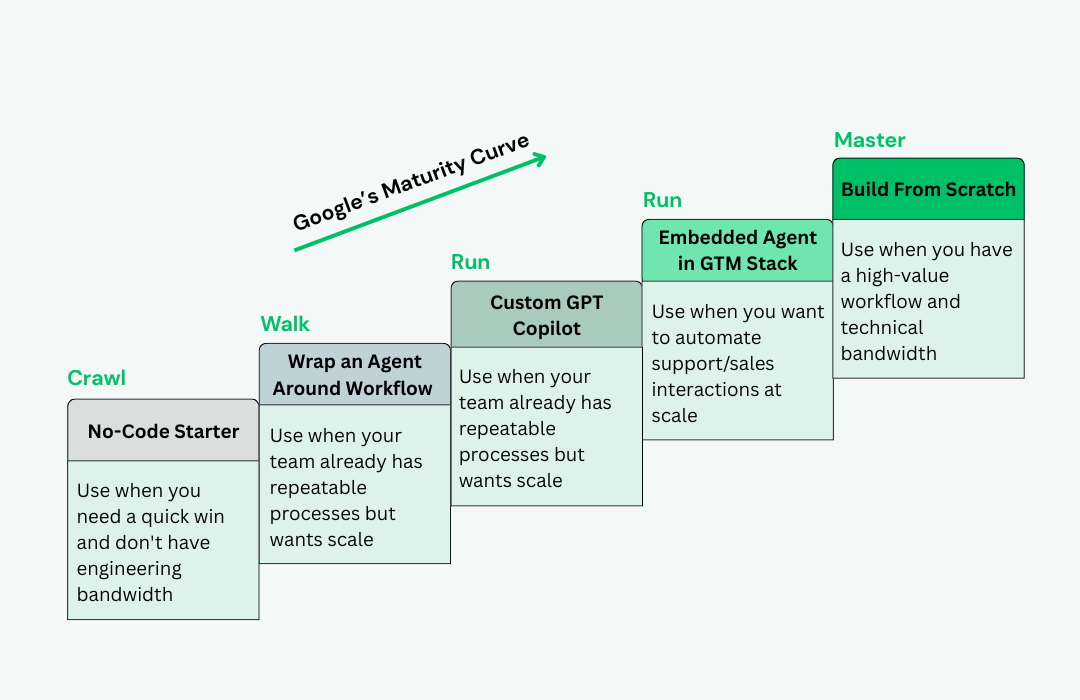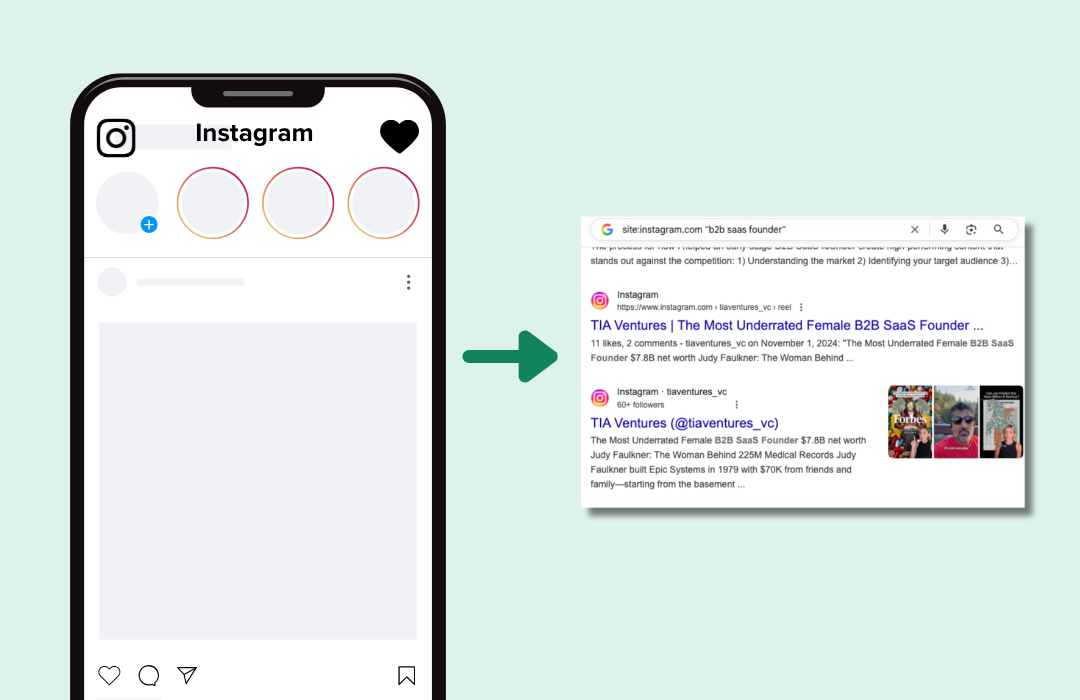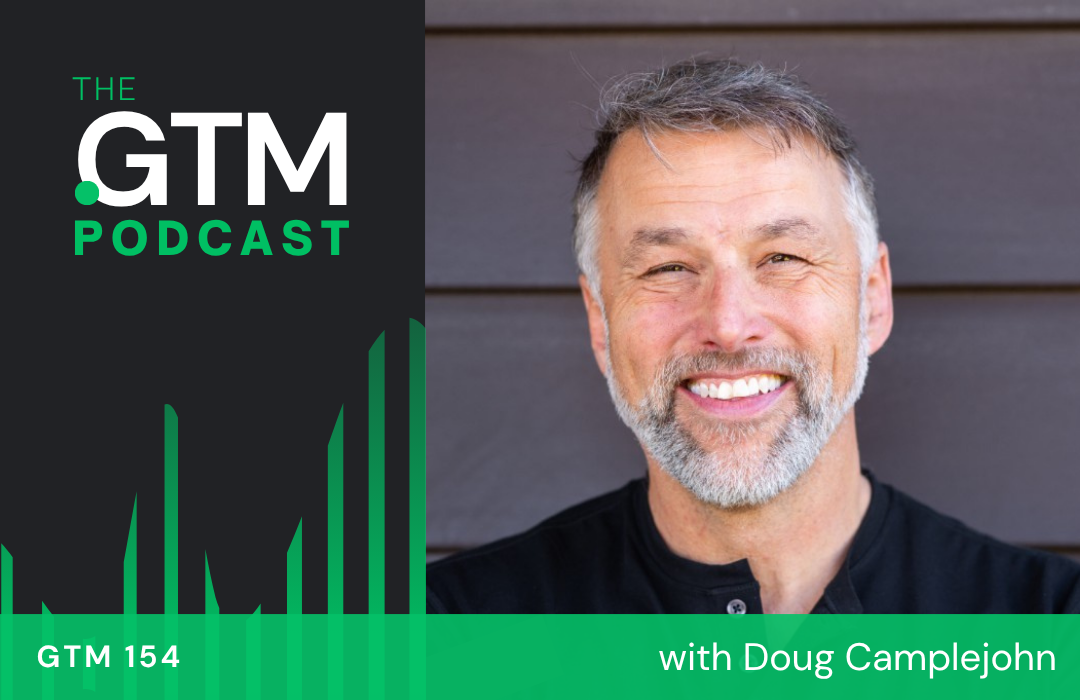This week on the Sales Hacker podcast, we speak with Zvi Guterman, founder and CEO of CloudShare.
Zvi is a serial entrepreneur. In 2011, he had a board-level disagreement with his shareholders … so he bought them out, to radically focus on his customers. He’s now experiencing 50% growth. On this episode, he discusses raising (or not raising) capital, customer centricity, and he also gives a few tips to sales people looking to gain the attention of the C-suite.
If you missed episode 81, check it out here: PODCAST 81: Science Behind Pre-Employment Testing w/ Amyra Rand
What You’ll Learn
- Who is Zvi Guterman and what is CloudShare
- Why founders should consider boot-strapping
- Advice to sales people trying to reach the C-suite
- Customer centricity
Subscribe to the Sales Hacker Podcast
Show Agenda and Timestamps
- Show Introduction [0:09]
- About Zvi Guterman and CloudShare [2:32]
- A Great Idea Isn’t Enough — Your Tech Must Connect With the Customer [9:37]
- Using Data to Determine What the Customer Truly Needs [13:32]
- When Zvi Charges for POCs [15:03]
- A Founder’s Advice to Sales People [16:42]
- Show Hand-On, Leave-Behind Value [22:00]
- Value to B2B Customers Translates to 1 Thing: Revenue [26:01]
- Sam’s Corner: [39:12]
Show Introduction
Sam Jacobs: Welcome to the Sales Hacker podcast. Today, we’ve got Zvi Guterman, founder and CEO of a company called CloudShare. Zvi raised a lot of money many years ago — the last time he raised money was 2011. The company is now profitable. He hasn’t raised money since, and, in fact, he bought out his shareholders, because there was a board-level disagreement about how he was running the company. So, he decided to go his own way, and I think it’s a really inspiring story.
He talks about being a product-driven founder and a product-led founder, and how he came to appreciate the beauty of go-to-market sales and what we do as sales people, and how to explain value. The final thing is learning how to put the customer at the center, which a lot of product-driven founders just don’t get.
Now before we get there, we want to thank our sponsors. First off, Vidyard. Now email isn’t dead, but man is it boring. Add video to emails to stand out in the inbox, for free, with Vidyard. Vidyard helps you easily record, send and track who is viewing your video content in three easy steps. Go to vidyard.com/saleshacker for more information.
Our second sponsor is Outreach, the leading sales engagement platform that enables sales reps to humanize their communications at scale, from automating the soul-sucking manual work that eats up selling time to providing action-oriented tips on what communications are working best. Outreach has your back.
Now, without further ado, let’s listen to this interview with Zvi Guterman.
About Zvi Guterman and CloudShare
Sam Jacobs: Hi everybody, it’s Sam Jacobs. Welcome to the Sales Hacker podcast. Today, we are excited to have Zvi Guterman, founder and CEO of CloudShare, which is a leading provider of specialized cloud environments. From software to cybersecurity, CloudShare enables enterprises to replicate complex on-prem IT environments in the cloud for powerful sales demos and proof of concepts, virtual training, sand boxing and support. Customers include such names as Palo Alto Networks, Atlassian, Sophos, Dell, and Fortinet. Zvi has leadership experience across a wide range of organizations, from his various fledgling startups to large national military organizations. He co-founded and served as CTO of Safend, an endpoint security solution acquired by Wave Systems. He’s also a board member and mentor of Qlika, a big data platform for ad words optimization acquired by Priceline many years ago. Zvi, welcome to the show.
Zvi Guterman: Hi Sam, excited to be here. Thanks for having me.
Sam Jacobs: I just read the description, but it’s always important, particularly since you’re the founder, and it’s your vision. Walk us through what is CloudShare, and give us your personal summary of what the company does.
Zvi Guterman: At CloudShare we’re trying to solve the problem of working with IT environments. The cloud is a huge revolution. It’s allowed us to have and enjoy utility computing, but that’s only the first step. It allows you to consume real tron machines and so on. But, when we take it to business users such as sales professionals, sales engineers, training professionals and so on, they are less interested in the technical element of real tron machine or memory and disk. They are more interested as business professionals in the training session we are going to run tomorrow, or a demo, or a POC. Our goal at CloudShare is to provide these different workflows to the business professionals, so they can enjoy the cloud without necessarily all the technical elements behind it.
Sam Jacobs: So give us a rough range in terms of how big it is.
Zvi Guterman: I started the company over 10 years ago. We raised over $30 million from some of the best VCs in the world, like Sequoia, Globespan, Charles River. We are almost 50 employees today, with R&D in Tel Aviv, Israel. The headquarters are here in San Francisco, California, and we have additional teams in Europe, Asia, and other locations in the U.S. We’ve been very profitable in the last four, maybe five years, and we’re growing nicely — over 50% year over year. We have hundreds of customers, being used by thousands of users in over 100 countries around the world.
Sam Jacobs: And your last funding round was 2011?
Zvi Guterman: Yes.
Sam Jacobs: Something’s going right.
A Great Idea Isn’t Enough — Your Tech Must Connect With the Customer
Sam Jacobs: What was the biggest surprise to you about sales and leading sales teams that you didn’t expect as a technologist?
Zvi Guterman: I remember initially thinking in a naïve way that technology can win everything. I was so proud of my technology, and I remember some of my first visits with the C-level executives as potential customers. They were asking us about our reporting system. I was super proud in our technology, and I said, “Hey, why do you care so much about the reporting? My technology is so powerful.” And the CIO kept saying, “No, I’m really interested in reporting.” Of course we lost that deal. So, I learned the hard way that if someone cares more about the reporting, we should comply. That’s just one example.
Sam Jacobs: Is there a framework for figuring that out — what the customer needs and wants? I mean, is it just a matter of asking good questions and proper discovery?
Zvi Guterman: For me, it’s just about being fanatic about the customer. Sometimes the user isn’t able to articulate exactly what they need.
Using Data to Determine What the Customer Truly Needs
Sam Jacobs: Is it just a function of looking at the data, getting customer feedback?
Zvi Guterman: You need to decide, “Is the feedback I’m getting right now, specific to this customer, and the way they think about it, or is it the entire market?”
When Zvi Charges for POCs
Sam Jacobs: Do you charge for your POCs? And do you recommend charging for them?
Zvi Guterman: You mentioned some of our largest customers. So, usually, these companies are coming when they’re ready to make a decision. They want a longer commitment — it’s a big step for them. They’re going to onboard hundreds if not thousands of people to the platform. It’s going to take more than a quarter. Usually they are ready to make a big investment again in the six and sometimes seven digit commitment. So for these customers, they usually are asking for a POC, and, usually, with us, it’s paid, because it’s a big commitment. Of course, later on, we are able to discount it, if it’s part of a larger deal, and so on.
For smaller customers, and growing companies, very often we find them in a stage of debt when they are not so confident in what they are ready to do, and they want to start small. We just allow them to start on-demand. Usually we don’t need a full POC — we just let them start with an on-demand pricing, which of course is a little bit more expensive, but it allows them the full flexibility. So someone will go for a month, and usually they convert later on to a longer commitment that provides them better terms.
A Founder’s Advice to Sales People
Sam Jacobs: There’s lots of sales people who are listening right now, and they’re trying to sell you things, Zvi. What do you think is the best, when you purchase things for your business? Do you ever think about how you’ve made that purchasing decision?
Zvi Guterman: I like the salespeople who are smart about how they interact and who are trying to solve my problem. If I’m looking for a new dashboard tool or a new financial tool, I really appreciate when someone is asking me, “Okay, what problem are you trying to solve? What’s your target?”
As a communication method, I’m fine with anything. We live in a modern world where sometimes interesting leads are coming from LinkedIn, sometimes it’s email. Sometimes we fill in a form, and I go sometimes just for a relevant conference in town. I’m really curious to learn about new technologies that allow us to move faster. The faster you can show me value and not waste my time and your time, the best value you can get from me.
Show Hands-On, Leave-Behind Value
Sam Jacobs: You said there’s a value in giving prospects hands-on control during presentations and leave-behind demos. Tell us what you mean by that.
Zvi Guterman: Many of the CloudShare customers are using us for demonstrating their own solutions. So we mentioned someone like Palo Alto Networks who’s using us for their demos. So, early on in the dialogue, in a classical marketing sales dialogue, you are doing this early qualification, maybe you showed the prospect some collateral, or the prospect was in a webinar. You cause some level of interest, and you get to the next level. Many times, people want some hands on and want to get a sense of your firewall, or your database, or your management solution, why it’s better. “Show me, give me some hands-on demo on your way or solution.”
CloudShare allows you to do that in the cloud, in a super easy way. The same way that we would use a Zoom session. So, instead of just looking at the presentation or a video with your prospect, you can go actually collaborate together on the real system in life. You get a private, dedicated, secure copy for that demo, which can be 45 minutes, or whatever duration you decide. After that, of course, as we think about the sales pipeline, and we progress later on, maybe we need a POC. Perhaps a prospect says “OK, that management screen looks actually really valuable, and I can see why it can make sense for us as a health organization, and I’m interested in that product. I want to get my own data. I’m worried maybe that …” and that’s later on in the process.
And then you can do the same POC in a super efficient way. You don’t need to orchestrate anything, you just click of the mouse and you get the two weeks or ten days or whatever of the same demo environment that you just started into a POC that the prospect can get hands on in their own time zone, remotely, using CloudShare. By doing so, we actually allow sales organization who want to really expand the pipeline in a wonderful way, to open and widen the number of leads and, later on, opportunities in a better way. You can control how much you spend, and you can say, “Okay, I see that leads in that stage of opportunities, I should only give them 30 minutes.”You can be really analytical.
It’s a good point to mention. One of my observations, again, working with many sales organizations over the recent years, is that people are becoming much more analytical about how we run the sales organization. We see people that if you’re able to be more analytic, you make better decisions, and you’re more effective.
Value to B2B Customers Translates to 1 Thing: Revenue
Sam Jacobs: One of the things that jumped out at me when I was reading your bio is, I mentioned it at the outset, but you haven’t raised money since 2011. Also, you are, perhaps not surprisingly and relatedly, a serial entrepreneur. I would imagine those things are related. There’s a world out there that’s sort of telling — particularly because the capital environment with negative interest rates, nearly infinite capital available — that’s telling entrepreneurs, founders, and companies, that they need to raise a tremendous amount of money and burn it very quickly. You’re taking a different approach. Walk us through your philosophy.
Zvi Guterman: Right now, the market is making it really easy for entrepreneurs to raise more and more money. We also witnessed, definitely in the last ten years, more accelerators opening, and it makes starting a technology company much easier, which is great. But, I think we should all remember, your number one goal is to approach the customer, to work with customers, to bring value to customers, and. in B2B, translate it into revenues.
So I encourage first-time CEOs and entrepreneurs to first look at the plan and say, “Hey, can I be profitable?” Again, I think we witnessed many great companies that actually didn’t even raise money, and, organically, made it to success. The first thing I would say to an entrepreneur to try to build a plan. In softwares, many times, you can just be two people or three people. Maybe you don’t need a lot of money. Try to build this path into the value that you get from your customers, how you get paid. It will also help you get a better validation for your entire concept. I encourage entrepreneurs to go that way. That will also allow them flexibility to control their own destiny.
So, try to see if you can do it without money. If you need money, of course. If you have a right reason, and if you want to accelerate faster, OK, that’s a wonderful reason to maybe raise money. You are already in a place where you have a product-market fit and you want to press the pedal. That’s the right way to do that. Maybe you want to buy some of your competitors in a later stage, that’s a good reason to raise money. But don’t pick it as the first path, because it’s the easiest one. That’s my input.
Sam’s Corner
Sam Jacobs: I enjoyed that conversation with Zvi Guterman because it’s great to listen to somebody who’s building a profitable business, who bought the business back from the investors, who’s focused on the customer, and who empowers the team to do great things.
A couple lessons from the conversation: The first is obvious, generic, and still relevant and important, which is put the customer at the center of the company. One of the things that early-stage companies, and product-led companies do, is they assume the product will sell itself. They assume that they know what’s best. All of those assumptions tend to be wrong.
Also, Zvi believes passionately in the concept of demonstrating value. So part of what CloudShare does is you can create demo environments where you can create a leave-behind demo. You create an instance where the customer themselves can do things on their own, manipulate things on their own, figure out how it works, and then at the end of it, if your product is as good as it is advertised, then they may become regular customers.
Finally, we talked about running your business from the perspective of profitability. Not necessarily a perspective of just pure, unadulterated growth. Lots of people are talking about that.
What We Learned
- Who is Zvi Guterman and what is CloudShare
- Why founders should consider boot-strapping
- Advice to sales people trying to reach the C-suite
- Customer centricity
Don’t miss episode 83
I hope you enjoyed the show. Before we go, let’s thank our sponsors. Outreach, the leading sales engagement platform and Vidyard. Vidyard helps you easily record, send, and track who is viewing your video content in real time in three easy steps. Email isn’t dead, but it sure is boring. Add video to your emails to stand out in the inbox with Vidyard.
If you want to reach out to me with feedback, you can reach me on LinkedIn. If you haven’t rated the show, please give us five stars on the iTunes rating system so that we can remain in business and continue to bring you this show.
As always, thanks so much for listening, I’ll talk to you next time.







